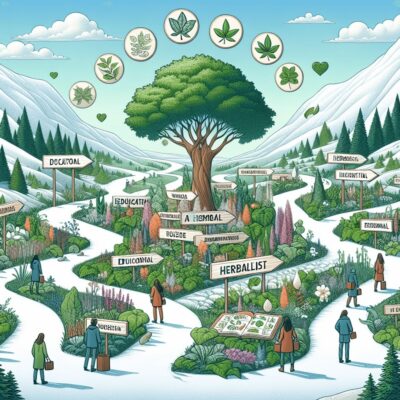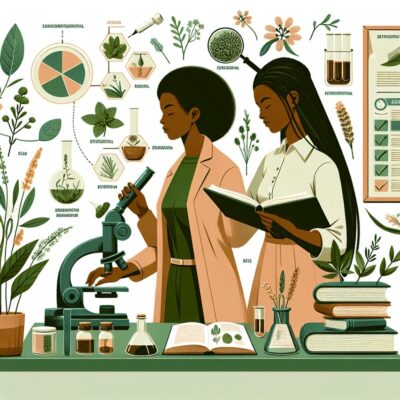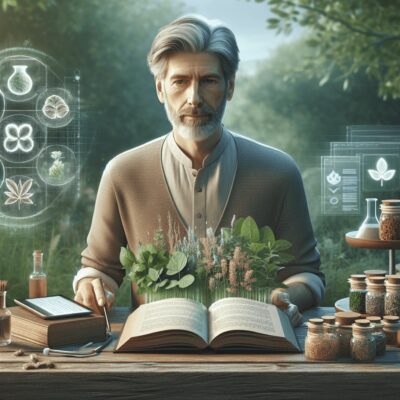Services
Herbalism For Everyone
Herbalism For Everyone – Professional Herbalism Course
Herbalism is one of the oldest healing traditions in the world, and it is now making a comeback in our modern society. This ancient practice of using plants for healing has caught the attention of health-conscious individuals who are looking for natural alternatives to traditional medicine.
The growing interest in herbalism includes:
- Casual enthusiasts who make their own remedies
- Dedicated practitioners who are building successful careers
There is a rising demand for natural healing methods, which has turned herbalism into a viable profession. Practitioners are now offering consultations, creating products, and educating communities about plant medicine.
This guide explores the world of herbalism, including its various approaches and career opportunities. Whether you’re interested in natural healing or thinking about pursuing a professional path in plant medicine, you’ll find practical insights to kickstart your herbal journey.
Understanding Herbalism
Herbalism is the practice of using plants for healing purposes. It combines ancient knowledge with modern scientific understanding. Herbalists carefully choose and use herbs in different forms such as teas, tinctures, and creams to promote health and wellbeing.
The History of Herbal Medicine
Herbal medicine has been around for thousands of years and has been practiced by various cultures:
- Ancient Egypt: Used detailed records of medicinal plants, documented in papyrus scrolls
- Traditional Chinese Medicine: Developed sophisticated herbal formulations over 2,500 years
- Ayurvedic Medicine: Created comprehensive plant-based healing systems in India
- Indigenous Practices: Preserved local plant knowledge through oral traditions
Different Approaches to Herbalism
Today, there are several ways people practice herbalism:
- Evidence-Based Herbalism
- Folk Herbalism
- Traditional Herbalism
- Intuitive Herbalism
Evidence-Based Herbalism
This approach relies on scientific research and clinical trials to understand the effects of herbs. It focuses on documented therapeutic benefits and aims to integrate herbal medicine with mainstream healthcare practices.
Folk Herbalism
Folk herbalism draws from family traditions and local knowledge. It emphasises practical experience and values community wisdom passed down through generations.
Traditional Herbalism
Traditional herbalism is based on established healing systems such as Ayurveda or Traditional Chinese Medicine. It incorporates cultural practices and beliefs while following methods that have been used for centuries.
Intuitive Herbalism
Intuitive herbalism involves developing a personal connection with plants. Practitioners use their senses to observe how different herbs affect them or others, combining this experiential learning with traditional teachings.
Each of these approaches offers valuable insights into plant medicine, contributing to a diverse range of healing traditions that continue to evolve today. 
Becoming an Herbalist: Pathways and Education
The path to becoming an herbalist offers diverse learning opportunities tailored to different learning styles and commitments. Your journey can range from structured classroom settings to self-guided exploration of herbal wisdom.
Intensive Training Programs
Professional herbalism training programs provide comprehensive education through structured curricula. These programs typically span 6-24 months, combining theoretical knowledge with hands-on experience.
Key components of intensive programs include:
- Plant identification and wildcrafting
- Medicine-making techniques
- Clinical assessment skills
- Therapeutic protocols
- Materia medica studies
- Body systems and physiology
- Research methodology
The hands-on aspects of these programs create invaluable learning experiences:
- Working directly with plants in gardens
- Creating herbal preparations
- Participating in plant walks
- Conducting case studies
- Learning from experienced practitioners
Many programs incorporate apprenticeship opportunities, allowing students to work alongside seasoned herbalists. This mentorship provides practical insights into:
- Client consultation techniques
- Product formulation
- Sustainable harvesting practices
- Business management skills
- Ethical considerations
Notable training formats:
- Weekend intensives
- Residential programs
- Clinical mentorship
- Online hybrid courses
- Community workshops
The immersive nature of these programs accelerates learning through direct experience. Students develop confidence in their skills through regular practice, feedback, and guidance from experienced instructors.
Working with plants in their natural habitat helps develop a deep understanding of their growth patterns, optimal harvesting times, and medicinal properties. This hands-on experience proves invaluable when creating effective herbal preparations and developing treatment protocols.
Self-Study Approaches in Herbalism
Self-directed learning offers a flexible path to mastering herbalism at your own pace. A well-curated collection of resources can serve as your foundation for herbal education.
Essential Books for Your Library:
- Medical Herbalism by David Hoffmann
- The Modern Herbal Dispensatory by Thomas Easley
- Rosemary Gladstar’s Medicinal Herbs
- The Herbal Medicine-Maker’s Handbook by James Green
Digital Learning Platforms:
- The Herbal Academy’s online courses
- Learning Herbs membership site
- Mountain Rose Herbs blog and educational content
- American Herbalists Guild webinar library
Your herbal library should include diverse perspectives – from scientific texts to traditional wisdom. Create a dedicated study space with dried herbs, field guides, and journals to document your observations.
Practical Learning Activities:
- Start an herb garden
- Create a plant identification notebook
- Practice making basic preparations
- Join online herbal communities
- Attend virtual workshops
- Document personal experiences with herbs
Building your knowledge through self-study requires dedication and systematic organisation. Keep detailed notes of your experiments, successes, and learning experiences. This documentation becomes an invaluable reference as you progress in your herbal journey.
Formal Education Institutions for Herbalists
Accredited institutions provide structured pathways into herbalism through comprehensive degree programmes and professional certifications. Notable schools include the American College of Healthcare Sciences and Maryland University of Integrative Health, offering bachelor’s and master’s degrees in herbal studies.
Benefits of Accredited Programs:
- Standardised curriculum meeting educational benchmarks
- Access to clinical practice opportunities
- Professional networking connections
- Recognition from healthcare institutions
- Structured learning environment
Considerations for Non-Accredited Programs:
- Lower tuition costs
- Flexible scheduling options
- Focus on specific herbal traditions
- Hands-on learning emphasis
- Less formal recognition
The choice between accredited and non-accredited education paths depends on your career goals. Accredited programmes suit those seeking integration with conventional healthcare systems, while non-accredited options serve practitioners focusing on community-based or private practice.
Many successful herbalists combine elements from both educational paths, creating a unique blend of formal training and traditional knowledge. The American Herbalists Guild maintains a comprehensive directory of both types of institutions, helping aspiring herbalists make informed decisions about their education.
Essential Skills for Success as an Herbalist
Success as an herbalist requires a diverse skill set that extends beyond plant knowledge. Here’s what you need to master:
Core Knowledge Base
- Deep understanding of botanical identification
- Proficiency in plant properties and interactions
- Knowledge of traditional and modern herbal preparations
- Ability to create custom herbal formulations
Clinical Skills
- Active listening for effective client consultations
- Clear communication of herbal recommendations
- Documentation and record-keeping practices
- Assessment of client needs and progress
Business Acumen
- Strategic pricing of services and products
- Inventory management
- Financial planning and budgeting
- Professional networking
Marketing Expertise
- Social media presence development
- Content creation for education
- Brand identity establishment
- Client relationship management
Safety and Ethics
- Understanding legal boundaries
- Recognition of contraindications
- Knowledge of quality control measures
- Proper sourcing of materials
Your success as an herbalist depends on blending these skills with practical experience. Many successful practitioners start with a strong foundation in plant knowledge and gradually build their business skills through practice and continuous learning. Regular updates to your knowledge base and adaptation to market trends help maintain a thriving herbal practice.
Ethical Considerations and Community Role of Herbalists
Ethical practices are the foundation of responsible herbalism. As an herbal practitioner, you must operate within specific boundaries to protect both your clients and yourself. The FDA prohibits herbalists from diagnosing medical conditions or prescribing medications – these activities remain strictly within the domain of licensed healthcare professionals.
Key Legal Guidelines:
- Avoid making specific health claims about herbal products
- Never recommend discontinuing prescribed medications
- Maintain clear records of client consultations
- Use appropriate disclaimer statements in your practice
Your role goes beyond working with individual clients; it also involves contributing to the wider community. Many herbalists make a positive impact by:
- Teaching plant identification workshops
- Hosting community gardens
- Participating in local health fairs
- Creating educational content about sustainable harvesting
Building strong relationships with clients requires open and honest communication about what you can and cannot do as an herbalist. Make it clear that you:
“Work alongside, not in place of, conventional healthcare providers to support wellbeing through herbal approaches”
Successful herbalists often team up with other wellness practitioners, creating a network of services that complement each other. This integrated approach helps establish credibility while providing comprehensive support for clients.
Community Engagement Ideas:
- Partner with local farms for herb sourcing
- Offer sliding-scale payment options
- Create seasonal wellness workshops
- Establish herb-sharing programmes
Being a member of professional organisations like the American Herbalists Guild can provide additional guidance on ethical practices and help you stay current with industry standards.
Exploring a Career in Herbalism: Conclusion
The path to becoming an herbalist offers endless opportunities for those passionate about plant medicine and holistic wellness. Your journey can start today – whether you’re drawn to the traditional wisdom of herbs, fascinated by their scientific properties, or eager to help others achieve optimal health.
Ready to transform your interest in herbalism into a rewarding career? Our Professional Herbalism Course provides comprehensive training to build your expertise and confidence. You’ll learn from experienced practitioners, develop hands-on skills, and join a supportive community of like-minded individuals.
Take the first step towards your herbal journey – explore our Professional Herbalism Course and unlock the potential of plant-based healing.
undefined
What is herbalism and why is it relevant in modern wellness?
Herbalism is the practice of using medicinal plants for healing and wellness. It has gained relevance in modern wellness due to the increasing interest in natural remedies and holistic health approaches, making it a popular career path for those passionate about plant medicine.
What educational pathways are available for aspiring herbalists?
Aspiring herbalists can pursue various educational pathways, including intensive training programs, year-long apprenticeships, self-study approaches, and formal education at accredited institutions. Continuous learning is essential in this field to stay updated on the latest practices and knowledge.
What essential skills are needed to succeed as an herbalist?
Key skills for success in herbalism include botanical knowledge, understanding plant properties and therapeutic uses, holistic health perspectives, effective client consultations, business acumen, and marketing strategies. These skills help herbalists effectively serve their clients and manage their practices.
Are there ethical considerations that herbalists should be aware of?
Yes, ethical considerations are crucial in herbalism. Herbalists should refrain from diagnosing or prescribing medications without proper qualifications. Additionally, they must be aware of legal regulations governing their practice, such as FDA guidelines, to ensure compliance and ethical conduct.
How can herbalists contribute to community health initiatives?
Herbalists can play a significant role in community health by offering education on the benefits of herbal remedies, participating in local health initiatives, and building strong relationships with clients. This fosters trust and promotes a holistic approach to community wellness.
What opportunities exist for a career in herbalism?
The field of herbalism offers various career opportunities for individuals passionate about plants and helping others. By pursuing a Professional Herbalism Course or similar educational programs, individuals can develop the skills needed to start their own practices or work within holistic health settings.
Discover more from DAD Ayurveda
Subscribe to get the latest posts sent to your email.








